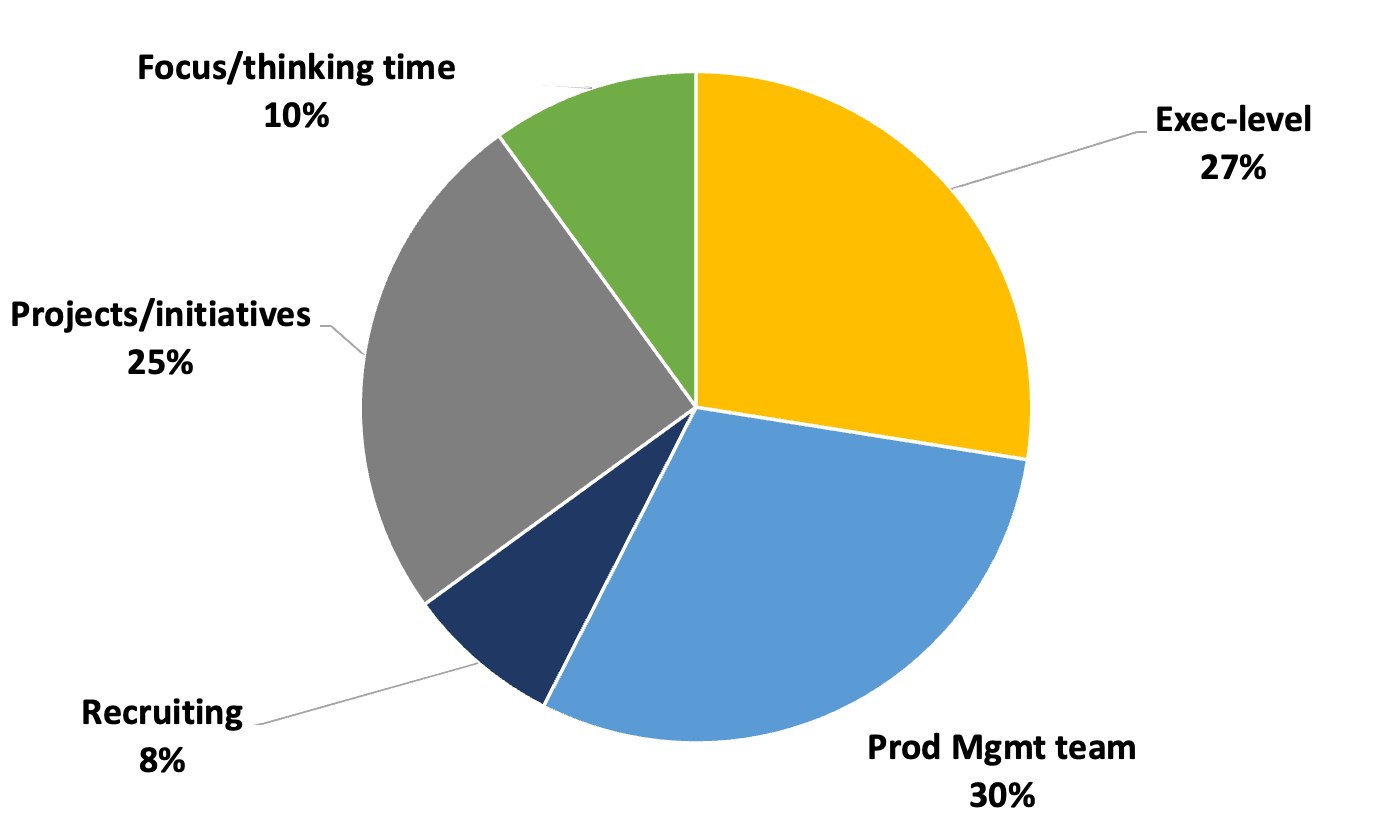My product leader coachees and I sometimes do calendar reviews. We look at their chock-a-block schedules, and talk about the struggle to address important things when faced with 7+ hours/day of meetings. We often feel a lack of agency (control), where our jam-packed calendars drive us from one discussion to the next — with no time to catch our breath or complete action items from the last six meetings.
Most product leaders (and managers at every level) report these symptoms:
- Work week calendar is almost 100% meeting’d up
- Little time to do the work/action items that come out of meetings
- Complaints from people who can’t get on our calendar
- Spending evening, early morning and weekend time trying to catch up
- Mentally and emotionally exhausted, with unsustainable pace and significant personal cost
- Sneaking out of Zoom sessions (camera off!) for body breaks, hoping that no one will notice
It’s also bound up in company culture. At our company, can anyone grab open time on my calendar without asking me first? Can the executive team? Are fellow employees offended when I decline meeting requests?
For me, this is similar to the core product prioritization problem: an infinite set of demands that each individual requestor considers to be extremely important/urgent. But for calendars, the scarce resource is time rather than development capacity. Just as we’ll never (ever!) get to the end of the backlog, we’ll never be able to accept all incoming invitations. It’s easy to feel guilty and overwhelmed.
How can we apply some good product thinking here?
A Quick-and-Dirty Tabulation with Optional Color Coding
Applying some Agile 101, it’s handy to understand a problem before we start fixing things. Perhaps a 10-minutes-or-less inventory of what’s actually on our current calendar. Can we sort events into a few piles and figure out where the time went? (Similar to rough-counting where we actually spend our development efforts.) Let's create and color code a few categories that match the broad responsibilities of a product leader:
Light blue: time within the product management team, one-on-ones with direct reports, mentoring, morale-building, merging each product team’s roadmaps or strategies into a coherent whole, occasional listen-ins on customer discovery calls
Dark blue: recruiting, candidate interviews, talent pipeline
Gray: project status, one-time or short-lived issues, external events
Green: solo thinking time, planning, strategy, doing "real work"

I find pie charts useful to see the overall picture. There's no magically perfect mix, of course, but this looks about right: almost a third of the week for the product management team itself (CPO and down), maybe a third for executive team and cross-functional peers (up and across the org), and a few carefully protected hours for uninterrupted thinking/writing/introspection. The rest is peanut-buttered over too many things. [We'll come back to the red night-and-weekend hours.]
Personally, there are two things that I block out first, so no one else can grab their slots:
[1] Recruiting and interviews. It's easy to personally pick up the products/projects that we intend to give to as-yet-hired product managers, but (for me) this is a dark pattern. Being a player/coach (i.e. playing part-time CPO and also part-time product manager) is a poor substitute for hiring the brilliant people we need. Poor results, high stress, lack of focus, brutal hourly context-switching... but there's a lot of pressure to "get everything done now" even when we're short-staffed. So we should block out time/energy for recruiting first. We're in a talent war, and product leaders who aren't fighting for excellent hires lose out.
[2] Three+ hours per week of "focus time" where I reserve solo time by inviting myself (and no one else). I find that 30-40 minutes of uninterrupted thinking and "real work" time is enough to carry me through the rest of the day. Ideally this is at the very start of the day for some organizational planning or strategy draft or dissect some complex issue that needs a strong product viewpoint. I try not to open email/slack yet, since that instantly overwhelms or panics me – and is bottomless. Doing even one bit of intellectual work refreshes my sense of purpose. And is often just what's needed later in the day.
From there, we can look at the overall time by pie slice. In a CPO/VP Product role, it's typical to spend about a third with the rest of the executive team and horizontal (cross-functional) peers, and a third with the extended product management team. Thinking of these as aggregates or "budgets" let us ask better questions than inspecting individual invitations. ("Am I spending enough time with my directs and PM teams? Which of the product meetings seem most useful/valuable, and which could be dropped or retuned? Could we alternate a low-interest weekly status slot with group learning or mentoring or strategy sessions or fun? Are we building trust and shared knowledge?")
And a good reminder that project/initiative meetings are lower priority: delegate, read the notes, skip sometimes.
Then we can take an incremental approach to small improvements — and reclaim a bit of control over our time. For instance, we might look for one meeting this week to reimagine/ cancel/ shorten/ delegate/ liven up/ attend sporadically. And one next week. Small gains in productive time and mood. Can you pick one idea from this list to experiment with?
- Project status meetings. Sometimes these mix high-level updates with very detailed cross-functional operational status and coordination... several VPs sit in every week but don't contribute much. (Or surreptitiously read their emails.) And the people doing the real work spend an hour crawling through complexities. If one of our product managers is covering this, we might drop in every third week to show executive interest and otherwise wait for a specific invitation.
- Agenda-less or poorly organized meetings. Ask what decisions/outcomes we hope to achieve. Ask for notes or action items from last week. In the silence that follows, maybe a show of hands for folks willing to cancel or rethink or shift to fortnightly. Reclaim one precious hour of everyone's time.
- Instant delegation. If this is a kickoff meeting for you to be briefed on a new project, then decide which product manager will be assigned – and you already know who will catch it – invite that person along to the kickoff. You can make introductions, sing their praises, and not have to repeat everything that happened. And can skip the follow-ons.
- Could this have been an email/slack? Blocking out a half hour (typically the shortest calendar space) for one-way communication or stand-and-deliver presentations can be a waste. Send me the two-line summary, attach the deck, and tell me if I have any action items. But don't expect an immediate response.
- Necessary but boring? Maybe we take the first 5 minutes of our weekly team get-together for appreciations. Or office-appropriate memes. Or new arrivals introducing themselves. Or restaurant recommendations. Or nominating people in other departments for thank-yous. Or take turns pitching each others' products to the group. Or a lighthearted round of "is it a feature or a bug?" (Pre-COVID, I'd ask everyone to sit in a different chair than they usually do.) Then dig into whatever needs doing. Glazed eyes indicate disengaged brains.
- Invent an occasional emergency. If you're not getting much out of an ongoing meeting or suspect you're not needed, skip it once. ("My llama needs to go to the vet, and their only slot is during our QBR pre-pre-planning meeting.") Did anything bad or interesting happen while you were gone? Did anyone notice?
If I budget no more than 10 hours per week for projects and status and partner meetings (oh my!), that gives me a good frame to consider these as a group: which of my many invitations will be most valuable to the company and my team? The rest are "below the line" and are politely declined.
Off-Hours Hours
While we often don't mark them on our calendars, most product leaders (and product managers and executives) spill our work into nights, weekends, and early mornings. It's occasionally required, but IMHO is counter-productive over the long term for both the company and ourselves. Lots of off-hours work lets us confuse time spend with value. In a good week, I can do 20 or 30 hours or really useful thinking/planning/doing/strategizing/mentoring... after that, it's mostly going through the motions. Many of us have sent knee-jerk email responses late at night that we regret later. Or been unable to shut off our busy brains so we can sleep.
Stating the obvious, habitual late-night/weekend patterns can also have a bad impact on home and family. (Yes, startup pressures and MBA-inspired executive attitudes encourage 24*7 office dedication). But put-upon partners and missed tuck-ins are not long-term solutions.
So I've marked those calendar slots in red. Two challenges:- Remote teams or directs scattered across 12+ time zones. COVID has encouraged us to think more globally, and brought us talented people from far away... but IMO we're still figuring this out. It feels like punishment to have rotating weekly meetings where someone is always up at midnight. Can we form teams with some reasonable clock overlap, say everyone within 4 hours of each other?
- Pitching distant customers. Wherever you live, you're guaranteed that some big prospect is on the other side of the world. And the sales team insists that only the CPO can credibly address some product issue. (Really?) I'd try to limit these — perhaps once every 2-3 weeks. Usually there is someone closer (and much more qualified!) to pick these up when I'm not available.
Sound Byte
Calendars aren't something we should obsess about, but gaining a little control over the day is worth some effort. Where can we experiment with improving or dropping meetings in order to be more effective (and less exhausted) leaders?

